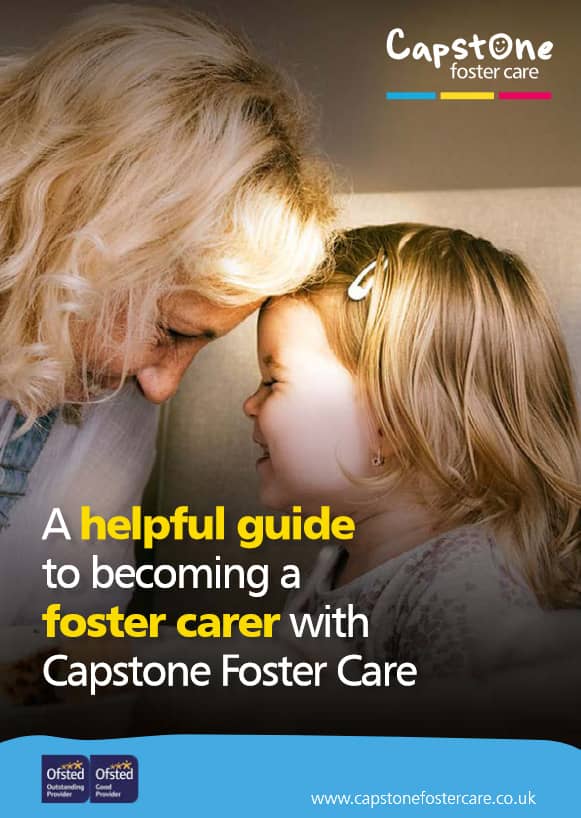


Fostering a disabled child
The role of an independent fostering agency
How to choose a foster care agency
Can I choose who I foster?
What are the benefits of fostering with an independent fostering agency?
What happens when a child is taken into care?
Fostering process: what happens on an initial home visit?
Fostering with local authority vs independent agency
A complete guide to becoming a foster carer
How Are Children in Foster Care Matched with Carers?
Foster Care Budgeting Tips
Becoming A Foster Carer
What is a Care Leaver?
What is a Foster Carer?
Fostering Regulations
How long does it take to become a Foster Carer?
What are the Foster Care requirements?
Changing IFA - Transferring to Capstone
8 reasons why a child may be taken into care
Fostering as a Career
Can you foster if you smoke or vape?
A guide to fostering assessments
LGBTQ+ Fostering
Equality, Inclusion & Anti-discriminatory Practice in Foster Care
What can disqualify you from foster care?
Can you foster if you’re on benefits?
Top transferable job skills to become a foster carer
Fostering as a same sex couple
Fostering while renting
Can you foster if you have mental health issues?
Is there an age limit for fostering in the UK?
Do foster carers get a pension?
How to foster a child: A step by step guide
How do DBS Checks Work?
Can I foster if...?
Mythbusting the top 10 Foster Care Myths
Can I foster if I am disabled?
LGBT Fostering Mythbusting
Can I foster if I have pets?
Can I Foster A Child?
Can I Foster and Work?
Can you Foster with a Criminal Record
Can Single People Foster?
LGBT Family and Foster Care
Fostering across Cultures
Muslim Fostering
Christian Foster Care
Sikh Fostering
Empty Nest Syndrome and Foster Care
Can I Foster?
What is the difference between residential care and foster care?
Fostering Babies and Young Children
What is Kinship Care?
Fostering Babies - Myths
Focusing on Parent & Child Fostering
Fostering Siblings
Fostering Teenagers
Fostering Teenagers - Breaking down the Myths
Fostering Unaccompanied and Asylum Seeking Children
Mother and Baby Foster Placements
Private Fostering
How does therapeutic fostering work?
Young Children Fostering Placements
Difference between short and long-term fostering
Types of self-harm
A Guide to the Foster Care Handbook
Reunification and Birth Parents: A Guide for Foster Carers
What is an EHC Plan? A Guide for Foster Carers
How to prepare a child for becoming a care leaver
Children who foster: impact of fostering on birth children
Fostering LGBTQ+ Youth
How to prepare your home for a foster child
How to help a lonely child: A Guide for Foster Carers
What are the National Minimum Standards for Fostering Services?
10 tips for foster children's education
How to prepare your foster child for secondary school
Tips for coping when foster placements end
Tips for foster parents during Coronavirus
What happens if foster parents get divorced?
5 ways to manage Mother's Day with foster children
Tips for managing foster children's bedtime routines
How to handle foster child bullying
Fostering allowances and the gender pay gap
What discounts can foster carers get?
How to adopt from Foster Care
5 ways to manage Father's Day for children in foster care
8 most common fostering challenges
FosterTalk Membership with Capstone Foster Care
Supporting foster children's contact with birth families
A guide to independent fostering
Keeping Children Safe Online: A Guide For Foster Carers
Movies About Foster Care
Play-based learning strategies for foster carers
A Guide to the Staying Put Program
How to deal with empty nest syndrome
How to recognise signs of depression in foster children
Can you take a foster child on holiday?
Tips and advice on fostering with a disability
10 tips on connecting with your Foster Child
Fostering vs Adoption - What's the difference?
How Fostering can change a future
How to adopt from Foster Care
How to encourage children to read in Foster Care
How to prepare a Foster Child's bedroom
Reading and Storytelling with Babies and Young Children
Supporting Children's Learning
The 20 most recommended books Foster Carers and young people should read
Things you can do when your children leave home
The impact of early childhood traumas on adolescence and adulthood
Anxious Disorders in Foster Children
What is sexual abuse and sexual violence
Foster Child behaviour management strategies
Foster Parent Advice: What to expect in your first year of fostering
Capstone's twelve tips at Christmas
10 celebrities who grew up in Foster Care
Could Millenials be the solution to the Foster Care crisis?
Do you work in Emergency Services?
Form F Assessor and Assessment Training
Foster Care Fortnight
Improving Children's Welfare - Celebrating Universal Children's Day
New Year - New Career - Become a Foster Carer
Young People Charities
Yes – make no mistake about it, fostering is a career. Choosing fostering as a career allows you the opportunity to work in a field where you can directly change a child’s life for the better. Want to know how much you could get paid for fostering as a full-time job? Read our guide.
For many people, fostering is life-changing - not just for the child in care, but for the carer, too. If you’re wondering if you can work and foster, our detailed guide answers all your fostering career questions.
The Department of Education reported that as of 31st March 2023, 82,170 children were in the care of their local authorities, with 71% of these children being looked after by a foster carer. This means there are over 20,000 children who are in need of loving, supportive homes.
If you have worked in the care sector or services industries, you might have already considered fostering as a career. However, you do not need any experience to become a foster parent. There are a wide range of professions - such as teaching, nursing, and emergency services - that also provide skills that can enhance your ability to foster.
In short, it depends on your circumstances. For example, if you’re single, fostering alongside your existing career would be incredibly difficult because fostering is a full-time job in itself. However, some fostering arrangements involve a predetermined period of time. In this situation, you could work a full-time job separate from your foster care responsibilities. Why? Because a respite foster carer will know in advance when their fostering services are required and can schedule their work accordingly.
Alternatively, if you’re fostering as a couple, you can often exercise a bit more flexibility when it comes to working while fostering. For example, one parent could ensure they’re available to meet the child’s needs whilst the other is working outside of the home.
Regardless of your employment status, the reality is that when you become a foster carer, your first priority is your foster child. So, when people ask “can fostering be a full-time job?”, the answer is most definitely yes – it is a 24/7 responsibility. With that said, our team at Capstone Foster Care are always willing to discuss your individual circumstances.
Whilst fostering isn’t about the pay, being a foster parent is a job, so our carers are renumerated to reflect that. Learn how much foster carers get paid for offering stability and security to a foster child. At Capstone Foster Care, we are also an Employee Owned Trust, which allows us to invest more in our foster carers, social workers and therapeutic support. Learn more about our trust status and why this sets us apart from other independent fostering agencies.
No, you don’t need prior experience working with children. Our training and support will ensure you have all the necessary skills and resources to start a successful career in fostering. Our foster care training courses are delivered by professionals and are always ongoing. There are a variety of courses available alongside our mandatory core training 'Skills to Foster', to equip you with all the information you may need.
Just like any job, fostering requires a set of skills to become successful in the role. Most of these skills will come naturally to you and will be skills you already possess, especially if you’ve had children before. These skills include:
Effective communication skills are essential as a foster carer, understanding and empathising with your foster child is an important skill to ensure that they feel nurtured and supported. It’s equally important to be able to communicate effectively with your social worker and others involved in your child’s care to ensure their needs are met.
While the primary care for your foster child is your responsibility, fostering is a team effort. You are part of a larger support system. Cooperation involves working closely with the wider team to deliver the best outcomes for your foster child.
Compassion is a skill that goes without saying for foster carers. Providing love and care is a foster carer’s number one priority.
To become a foster carer, you must first answer the question - do you have a spare room? If you do, the next step is to complete an enquiry form and begin discussing your foster care application with a member of our team.
A lot of people are afraid to take this step because they eliminate themselves for reasons that don’t matter at all. Find out the foster care requirements to see if you qualify to start your foster care career today.
If you have questions or concerns regarding foster care careers that have not been answered here, get in touch with Capstone Foster Care. We are eager to talk to you and answer your questions.
If you’ve got any questions or would like to find out more about fostering with Capstone, fill out the form below.
An experienced fostering advisor from your local area will then be in touch.

Start the conversation today. Our team of friendly advisors are on hand to answer any foster care questions you may have. We can offer you honest and practical advice that can help you decide if becoming a foster carer is the right path for you.


